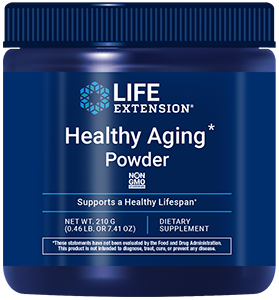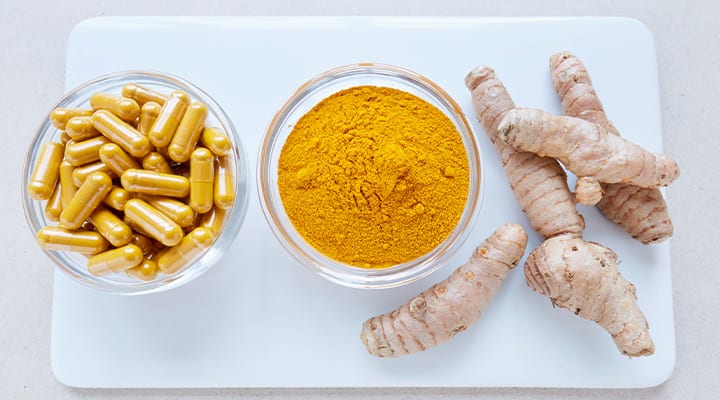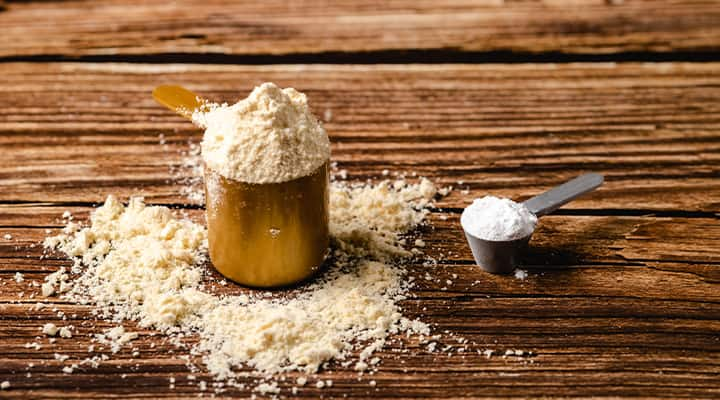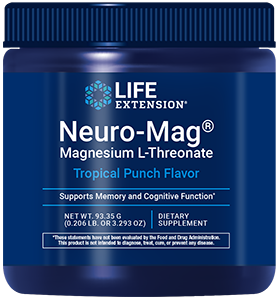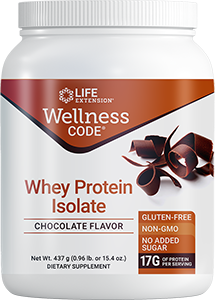
How to Take Powder Supplements
Published: April 2024
In a perfect world, we get all the nutrients we need from food alone. However, that's just not feasible for most of us. This is where supplements come in.
But not everyone likes swallowing capsules and tablets, and gummies aren't always an option, either. Good news: powdered supplements are a great alternative. Like more traditional supplement forms, they can be a helpful addition to other smart lifestyle choices, like getting plenty of sleep and moving your body each day.
We're covering the best way to take powdered supplements, whether they're better to use than capsule form, and which powder supplements you might want to consider taking. Let's go!
What is the best way to take powdered supplements?
Unless your healthcare provider tells you otherwise, the best way to take supplements in powdered form is exactly as the label tells you to. The label might suggest certain beverages you can mix the powder with (like water or juice) as well as the volume of liquid to use (like eight ounces).
More specific instructions may or may not be provided. For example, some powdered supplements might tell you not to mix the powder with liquid that's either very cold or very hot. This can be for a couple of reasons. First, it could make it harder for the powder to adequately dissolve, leaving you with a clumpy drink. Second, it could render the formulation less effective. If applicable, these details will indeed be on the label! So again, follow the product's recommended usage.
Are supplements better in powder or capsule form?
If you've assumed that the benefits of taking capsules outweigh more "fun" options like a powder mix, we've got news for you: truthfully, one isn't better than the other. Rather, they're just two different delivery methods. These two things—and tablets, for that matter—are essentially the same when it comes to the active ingredients involved.
Imagine you emptied the contents of a capsule and poured it into your drink—you'd be getting the same thing. (That being said, we don't actually recommend breaking open a capsule and consuming the powder if what you want is a powdered supplement; the contents of a capsule weren't meant for consumption in this manner and might not taste that great!)
So why choose capsules over powders, or vice versa? Some people prefer the speed and convenience of consuming a capsule or tablet and being done with it. Others enjoy drinking their supplement, with flavored protein powders being a common go-to. Another popular option is to add powder to a favorite recipe. It largely comes down to individual preference.
Either way, powders are a simple way to support your intake of any given supplement. And if you already take capsules and tablets and have a new supplement to add to your regimen, a powder is a good way to "mix things up" (quite literally) because pill fatigue can be a real thing.
6 most popular types of supplement powders
Now that you know a little more about powders, let's talk more about which specific supplements might be best for you. Just like supplements in other forms, what you should take largely depends on your health needs and nutrition goals, but here are a few examples of the most popular options.
1. Protein
If you've found that you have a hard time getting enough protein in a given day—which is especially common for vegans and vegetarians—a protein powder can be helpful to increase your intake.
Whey protein powder, found in dairy products, is a common type of protein. Protein is important in maintaining and building lean muscle mass (which is why blending a protein supplement into smoothies or shakes is a great post-workout boost for athletes), but it goes so much further than that.It also plays a role in bone health and the creation of hormones and enzymes. Plus, it gives you sustained energy. It'll also help you if you have weight loss goals. But this is just the tip of the iceberg! Protein is involved in literally every single cell in the human body.
The best part? If you're not in the mood to drink your protein powder, you can eat it. There are all sorts of recipes to try—like protein chocolate chip cookies, or tossing a scoop into your morning smoothie! Not in love with the taste? You can find unflavored protein supplements as well.
2. HMB
Like protein powder, a targeted workout formula that contains the muscle-supporting ingredient ß-hydroxy-ß-methylbutyrate (HMB) could be a great addition to your diet if you're an athlete who wants to support muscle function and growth.
In one randomized, placebo-controlled trial, men and women received either three grams a day of HMB or a placebo, and they also trained for four weeks. In the end, the HMB group saw a bigger increase in upper-body strength compared to the placebo group. Another study echoed similar results but with lower-body strength.
And the benefits even translate to outside of the gym! In another study, men and women were confined to 10 days of bed rest. Starting five days prior and continuing to the end of the study, they consumed either three grams of HMB a day or a placebo. In the end, the placebo group showed a significant decline in lean muscle mass, while the HMB group showed no change.
In other words, if you typically have a hard time maintaining or growing your muscle mass, HMB might be the way to go.
3. Healthy aging powders
If you want to keep your cognitive health and memory intact as you get older, a powder that supports healthy aging might be a good fit.
Look for powders that include taurine, lithium, and spermidine to encourage cardiovascular health, exercise performance, and cognitive function, all of which can promote wellness as you get older. Research has found that low levels of taurine can impact your health as you age, and supplementing with taurine can support exercise performance and already-healthy blood pressure.
In addition, spermidine can support healthy memory, while lithium encourages a positive mood and has even been associated with a healthy lifespan.
4. Magnesium
Generally speaking, we don't get as much magnesium from our diets as we used to because soil quality has gone down. One consequence of this is a decreased nutrient density in our crops, which means less magnesium.
With this in mind, it might be time to try a magnesium supplement. Magnesium L-threonate is a great option—and conveniently available in powder form—for promoting working memory, healthy recall speed and overall cognitive health. And supplementing offers certain health benefits. In one randomized, placebo-controlled trial with 44 adults ranging from 50 to 70 years old, the group receiving a daily dose of 1.5 to two grams of magnesium L-threonate showed markedly better cognitive and executive function in just 12 weeks.
5. Fiber
Fiber is important for satiety (meaning it's great for supporting your weight loss efforts!), cardiovascular health, already-healthy blood sugar levels and staying regular. One meta-analysis of 12 randomized controlled trials even found that consumption of two or more grams of fiber a day for three to 12 weeks helped participants maintain already healthy LDL and HDL cholesterol levels.
In another study of 25 healthy middle-aged men, those who added glucomannan (a dietary fiber) to rice before eating it maintained healthy blood sugar levels, compared to participants who ate the rice alone. Furthermore, the more glucomannan they consumed, the better the results were.
If you're looking for an easy fiber to add to your routine, try one formulated with glucomannan from konjac root.
6. Vitamins and mineral mix
For a powder that offers all-around support, you may want to turn to multinutrient formulas for whole-body health. Seek out formulas that contain vitamins and minerals alongside fruit and vegetable extracts to make it easier for you to get many of the nutrients your body needs each day.
These types of supplements are excellent for promoting healthy aging and metabolic and cardiovascular health, inhibiting oxidative stress and even supporting a healthy inflammatory response.
Remember: food alone might not be enough to get the many important nutrients your body craves. Where your meals fall short, powder supplements can fill in the gaps! There are so many ways to use powders—whether you mix them into your beverage or incorporate them into more complex recipes. Regardless, always go with a brand you trust, one that uses only high-quality ingredients, and always use them as directed!
Pro tip: If you need help determining which supplements you should add to your daily nutrition, take our health needs quiz!
References
- Deutz NEP, et al. "Effect of β-hydroxy-β-methylbutyrate (HMB) on lean body mass during 10 days of bed rest in older adults." Clin Nutr. October 2013. https://pubmed.ncbi.nlm.nih.gov/23514626/
- Fajardo VA, et al. "Trace lithium in Texas tap water is negatively associated with all-cause mortality and premature death." Appl Physiol Nutr Metab. April 2018. https://pubmed.ncbi.nlm.nih.gov/29206474/
- Guan L, Miao P. "The effects of taurine supplementation on obesity, blood pressure and lipid profile: A meta-analysis of randomized controlled trials." Eur J Pharmacol. October 2020. https://pubmed.ncbi.nlm.nih.gov/32871172/
- Ho HVT, et al. "A systematic review and meta-analysis of randomized controlled trials of the effect of konjac glucomannan, a viscous soluble fiber, on LDL cholesterol and the new lipid targets non-HDL cholesterol and apolipoprotein B." Am J Clin Nutr. May 2017. https://pubmed.ncbi.nlm.nih.gov/28356275/
- Jun S, et al. "Dietary Protein Intake Is Positively Associated with Appendicular Lean Mass and Handgrip Strength among Middle-Aged US Adults." J Nutr. December 2021. https://pubmed.ncbi.nlm.nih.gov/34494110/
- Liu G, et al. "Efficacy and Safety of MMFS-01, a Synapse Density Enhancer, for Treating Cognitive Impairment in Older Adults: A Randomized, Double-Blind, Placebo-Controlled Trial." J Alzheimers Dis. 2016. https://pubmed.ncbi.nlm.nih.gov/26519439/
- Montgomery DR, et al. "Soil health and nutrient density: preliminary comparison of regenerative and conventional farming." PeerJ. January 2022. https://pubmed.ncbi.nlm.nih.gov/35127297/
- Panton LB, et al. "Nutritional supplementation of the leucine metabolite beta-hydroxy-beta-methylbutyrate (hmb) during resistance training." Nutrition. September 2000. https://pubmed.ncbi.nlm.nih.gov/10978853/
- Pekar T, et al. "The positive effect of spermidine in older adults suffering from dementia: First results of a 3-month trial." Wien Klin Wochenschr. May 2021. https://pubmed.ncbi.nlm.nih.gov/33211152/
- Schrauzer GN, de Vroey E. "Effects of nutritional lithium supplementation on mood. A placebo-controlled study with former drug users." Bio Trace Elem Res. January 1994. https://pubmed.ncbi.nlm.nih.gov/7511924/
- Singh P, et al. "Taurine deficiency as a driver of aging." Science. June 2023. https://pubmed.ncbi.nlm.nih.gov/37289866/
- Thomson JS, et al. "Effects of nine weeks of beta-hydroxy-beta- methylbutyrate supplementation on strength and body composition in resistance trained men." J Strength Cond Res. May 2009. https://pubmed.ncbi.nlm.nih.gov/19387396/
- Waldron M, et al. "The Effects of an Oral Taurine Dose and Supplementation Period on Endurance Exercise Performance in Humans: A Meta-Analysis." Sports Med. May 2018. https://pubmed.ncbi.nlm.nih.gov/29546641/
- Yoshida A, et al. "Glucomannan Inhibits Rice Gruel-Induced Increases in Plasma Glucose and Insulin Levels." Ann Nutr Metab. July 2020. https://pubmed.ncbi.nlm.nih.gov/32659777/
- "Protein." Better Health Channel. https://www.betterhealth.vic.gov.au/health/healthyliving/protein

